PRISTINA, 23.12.2018 – One of the challenges of the modern world is facing the fight against “false news” or “fake news”. The inexistent news usually appears in the events of great interest to the public or on the verge of them. This is because the media use the big curiosity of the mass for various benefits. During the time of the last US elections, a large number of “False News” come from the Macedonian city of Veles. This news was created by a group of teenagers. One of them stated that during this time he earned about € 1,800 a month. Because of the great benefits, these kinds of untold news were spread all over the world.
Fake news also in Kosovo
During May of this year, correct reporting, a large number of false news came from the banks of the Lepenc River, where as a result of an accident, two Kosovo Police officers had fallen into the river. The great public curiosity caused the news to be in the media for ten days in a row. In addition to ethical violations during the reporting, this case was covered by many “false news” or “fake news” that was produced especially by portal journalists.
Sadat Kalisi from Hani i Elezit is one of many citizens who became prey to this news. He says that for the first time at that time he faced the false news.
“I personally was among the citizens who voluntarily joined the search for two police officers in the Lepenc River. It has been one of the most vulnerable cases since the end of war in our district, so I think it has caused that any news we read to take for granted. But from those reports for the first time I become prey to false news. It was rumored that one of the police officers was found, and for a few minutes it was known that this news was fake. I think the families of two police officers have been damaged most by these kind of news”, Kalisi stated.
During that time, in some portals you could often read the news that one of the police officers was found, while in reality the search in field were not yielding any results. Those at the scene of event could see the truth on one hand and on the other hand to keep the fake news on the portals. Within this news, there was not even a single confirmation, since all the information was based on alleged sources of media and title, and after a few minutes it was understood that it was “Fake News”.
Why do we become prey of “fake news ” and how should this problem be resolved ?
Professor of the University of Pristina, Lindita Tahiri, says the phenomenon of fake news is closely related to how the recipient accepts the message.
“Fake news is related to the awareness of how we approach the messages we receive from the media and the need to develop critical thinking about the media content. Fake news is prevented by the development of logical argumentation, creativity and critical thinking so that individuals are properly informed and able to participate as responsible citizens in the development of democratic society”, says Professor Tahiri.
The media view is a factor, which, according to Tahiri, should not be neglected when talking about this kind of news.
“Individuals should know that all media are constructed and contain certain values and views. People should use their skills, beliefs and experiences to construct their meanings from media messages; media and media messages can affect beliefs, views, values, behaviors, and democratic processes”, said Tahiri.
According to sociologist Besim Gollopeni, low education of the mass is the main factor that enables fake news to have such a huge impact.
“The rapid development of technology in general and the Internet in particular has enabled the society to have permanent access to multidimensional placement and receiving information, making this information in some cases professionally unfiltered or “Fake News”. Naturally, “Fake News” or “False News” have a multidimensional impact on the broad mass of society in certain moments and places. The most common victim of false news are uninformed citizens, mainly with low educational levels, lack of social, psychological and economic stability,” Gollopeni notes.
Gollopeni further says that there should be a greater control especially of portals because in most cases it is unknown who is behind the writing or who is leading a certain online media.
“False news from anyone and from wherever they come, are aimed at convincing the citizen and material benefit from the citizens. Among the concrete actions to be taken in preventing the fake news are: the recording of print and online media by the relevant institutions, the identification and registration of the administrators of various informative sites and the imposition of punitive legal measures” Gallopeni added among others.
Unlike the sociologist, professor of journalism Faton Ismajli, sees the solution of the problem with false news through the media education.
“Suzanne Nossel, a human rights activist, describes the best the recipe to protect against the epidemic of fake news. She says we need to educate consumers to build their skills to protect themselves. So, media education, whether formal (educational institutions) or through informal education through the organization of roundtables and trainings for social groups, ranging from teachers to professors to continue with the education of parents, students and other social categories”, Ismajli said.
According to Ismajli, the education of all categories is necessary, because not only citizens become prey of fake news but also the media itself.
“The comments on social networks at satirical portals clearly show that a large part of the readers have no idea that there is a journalism to make fun. A satirical portal wrote that a publicist “had demanded the removal of Skanderbeg from Pristina as he is not a Kosovar” became a “reliable” information for thousands of commentators in the FB, even for some media, to publish it as a true news. So, educating social groups about the use of the media, for verifying information would be vital to avoid this impact. Like any work that starts with one step, one step forward, and media education on fake news should go a step further to keep up with other steps to fight fake news every day, “said Ismajli.
As far as the legal aspect is concerned, in the Republic of Kosovo there is a Civil Law against Defamation and Insult, which in Article 4, paragraph 1, states that any person may demand to stop the defamation through a court proceeding and seek compensation for the damage caused.
“A person has the right to demand to stop the defamation and insult and to demand that it will not be repeated in the future, the refutation of defamatory or insulting information concerning his/her person and compensation for moral and material damage caused by the defamation and insult,” reads article.
But many times over the past few years, there has been a need for greater regulation on the Kosovo media scene and greater control over media owners, how and by whom they are founded, and who is behind them. Much of the media is created for certain period of time by often producing fake news for certain interests of someone without giving responsibility first to the audience and then even before the law.
Author: Valmir Gallopeni
This article is a production of the Association of Journalists of Kosovo under the project “Western Balkan’s Regional Platform for Advocating Media Freedom and Journalists Safety”, funded by the European Union. The content of this publication can in no circumstances be regarded as reflecting the position of the European Union.



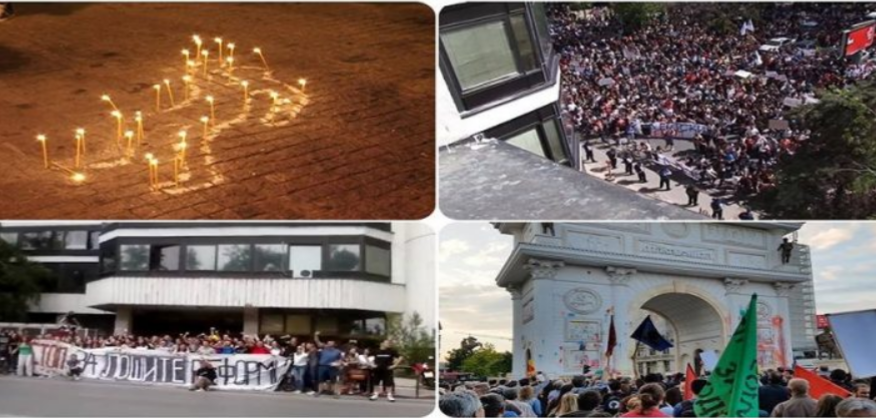



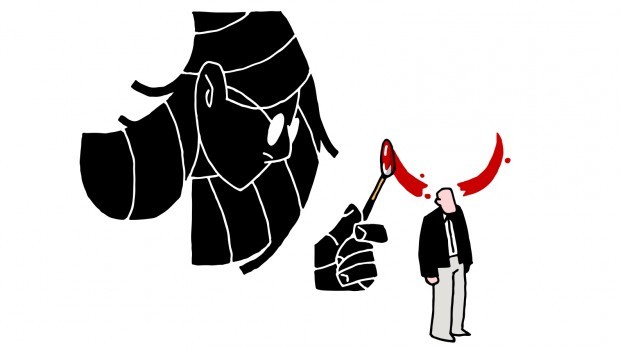

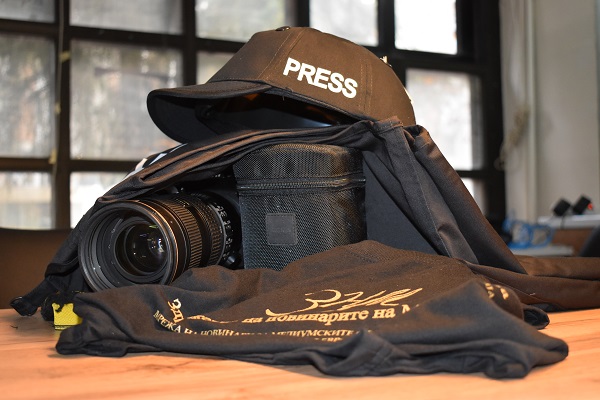
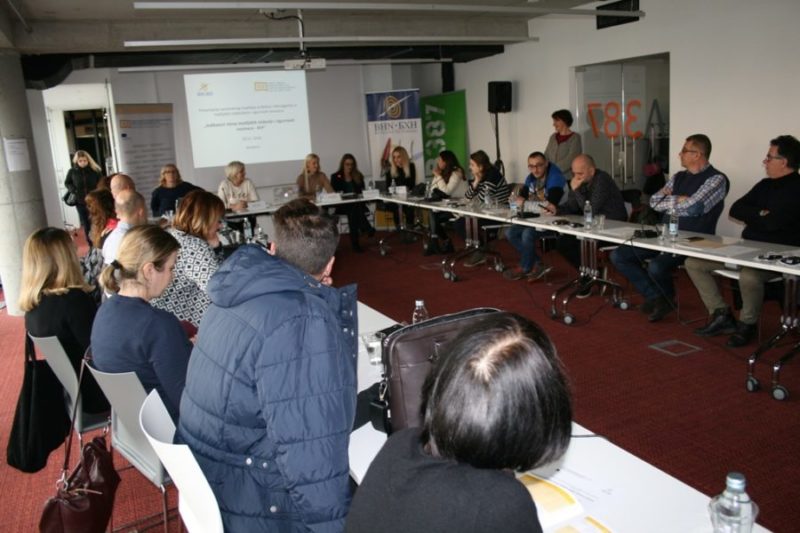
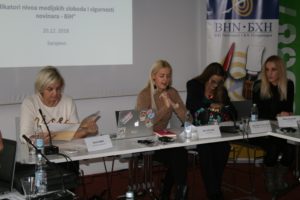 The author of the research and lawyer in the BH Journalists Association Rea Adilagić emphasized that this reports presents results of the third report conducted within the project Western Balkans Regional Platform for advocating Media Freedom and Journalists Safety, that is implemented by the national associations in Bosnia and Herzegovina, Kosovo, Macedonia, Serbia and the Trade Union of Media in Monte Negro.
The author of the research and lawyer in the BH Journalists Association Rea Adilagić emphasized that this reports presents results of the third report conducted within the project Western Balkans Regional Platform for advocating Media Freedom and Journalists Safety, that is implemented by the national associations in Bosnia and Herzegovina, Kosovo, Macedonia, Serbia and the Trade Union of Media in Monte Negro.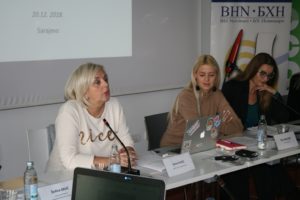 Secretary General of BH Journalists Association Borka Rudić presented shorty the work of the Platform, saying it is an example that the regional approach and networking of journalistic associations can achieve more effective protection of media freedom and the rights of journalists, given the similar socio-political context in the regions of this region.
Secretary General of BH Journalists Association Borka Rudić presented shorty the work of the Platform, saying it is an example that the regional approach and networking of journalistic associations can achieve more effective protection of media freedom and the rights of journalists, given the similar socio-political context in the regions of this region.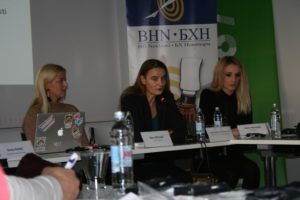 Head of Communication and Spokesperson in EU Delegation in BiH, Jamila Milović Halilović pointed out that this project is one in the series of those that are aiming to improve the position of journalists and to protect freedom of expression, but at the same time to help BiH to fulfill the conditions for joining the European Union in a better and faster way.
Head of Communication and Spokesperson in EU Delegation in BiH, Jamila Milović Halilović pointed out that this project is one in the series of those that are aiming to improve the position of journalists and to protect freedom of expression, but at the same time to help BiH to fulfill the conditions for joining the European Union in a better and faster way.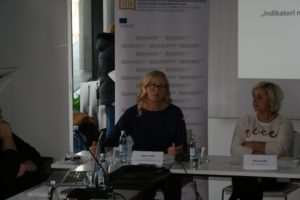 Until now, Štefica Galić has so far faced countless verbal and physical attacks for promoting democratic values, freedom of speech, critical thinking, and the idea of justice, equality and the protection of human rights. For her social engagement she recieved the Johann Philipp Palm Price for Freedom of Speach 2018.
Until now, Štefica Galić has so far faced countless verbal and physical attacks for promoting democratic values, freedom of speech, critical thinking, and the idea of justice, equality and the protection of human rights. For her social engagement she recieved the Johann Philipp Palm Price for Freedom of Speach 2018.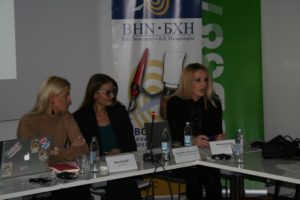 Journalist Melita Mujadžić says politicians on highest positions in the Una – Sana Canton threatened to her, called her on phone and requested she changes her reports or she should give up from her professional integrity, exactly because she was braver and louder than other colleges. They were even sending her messages through her editor to „calm down“!?
Journalist Melita Mujadžić says politicians on highest positions in the Una – Sana Canton threatened to her, called her on phone and requested she changes her reports or she should give up from her professional integrity, exactly because she was braver and louder than other colleges. They were even sending her messages through her editor to „calm down“!?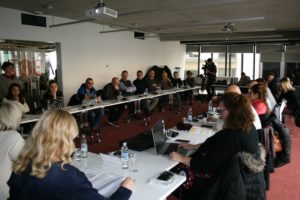 During the two-hour debate, the present participants from the media community and the international community especially emphasized the importance of publicly announcing every attack on journalists and the media, and thus urging citizens to support media freedoms. It is important that the journalists themselves express their support and solidarity to their colleagues – victims of attacks through writing about these cases and publicly publishing the names of the attackers. They concluded that mutual solidarity, support and public condemnation of any attack on journalists was the best allies to media professionals in the fight against frequent pressures and threats. From the gathering in Sarajevo the juridical and state institutions are called upon to work more dedicated and more efficiently in protecting media freedom and rights of journalists, and the request for having an special media ombudsman, as an independent mechanism for protecting media freedom in repeated.
During the two-hour debate, the present participants from the media community and the international community especially emphasized the importance of publicly announcing every attack on journalists and the media, and thus urging citizens to support media freedoms. It is important that the journalists themselves express their support and solidarity to their colleagues – victims of attacks through writing about these cases and publicly publishing the names of the attackers. They concluded that mutual solidarity, support and public condemnation of any attack on journalists was the best allies to media professionals in the fight against frequent pressures and threats. From the gathering in Sarajevo the juridical and state institutions are called upon to work more dedicated and more efficiently in protecting media freedom and rights of journalists, and the request for having an special media ombudsman, as an independent mechanism for protecting media freedom in repeated.
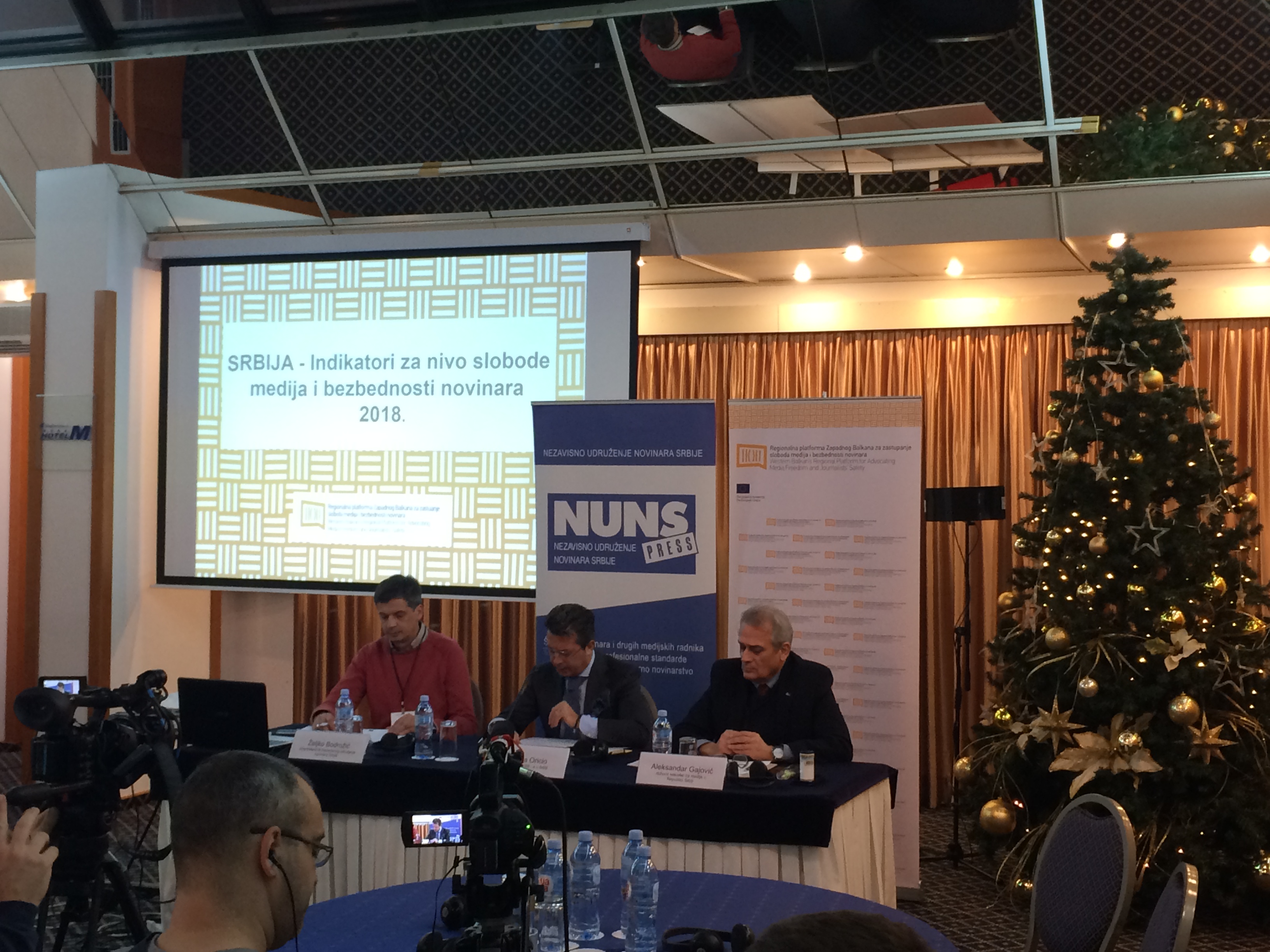
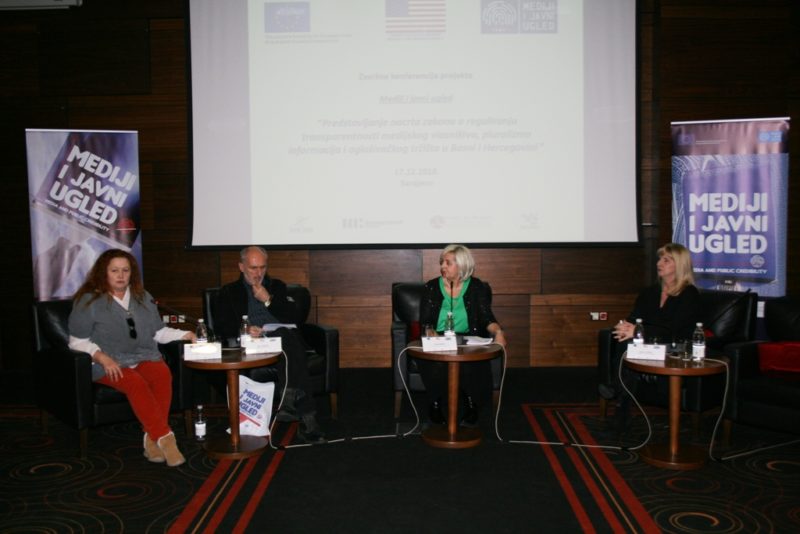
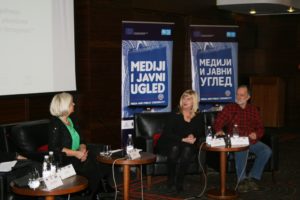 Media expert from the NGO JaBiHEU Samra Lučkin emphasized that the intention of the drafters is to provide the public with better and more objective information, more free media coverage, protection of journalists in the performance of tasks, and the media to fight equally on the market and ultimately increase the income.
Media expert from the NGO JaBiHEU Samra Lučkin emphasized that the intention of the drafters is to provide the public with better and more objective information, more free media coverage, protection of journalists in the performance of tasks, and the media to fight equally on the market and ultimately increase the income.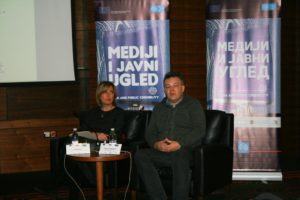 , and that media practicals who know the best what is necessary in media sector in BiH participated in the process.
, and that media practicals who know the best what is necessary in media sector in BiH participated in the process.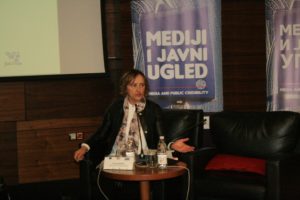 Attorney at Law and Expert of Council of Europe from Zagreb Vesna Alaburić, who worked on the Draft Law on Transparency of Media Ownership, said that in the context of transparency of ownership, it is very important for the public to notify the media ownership in order to assess the information obtained but also the biggest problem is portals.
Attorney at Law and Expert of Council of Europe from Zagreb Vesna Alaburić, who worked on the Draft Law on Transparency of Media Ownership, said that in the context of transparency of ownership, it is very important for the public to notify the media ownership in order to assess the information obtained but also the biggest problem is portals.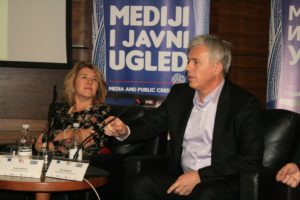 President of UMI (Media Industry Association) and the director of HAYAT TV Elvir Švrakić emphasized the media owners themselves are unknown to public, nor is it known why they work or whether they have interests in editorial policy – which makes it is clear why these laws are needed.
President of UMI (Media Industry Association) and the director of HAYAT TV Elvir Švrakić emphasized the media owners themselves are unknown to public, nor is it known why they work or whether they have interests in editorial policy – which makes it is clear why these laws are needed.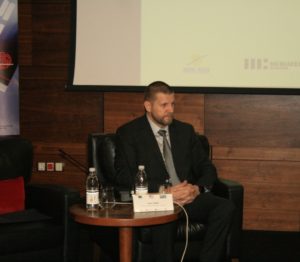 Minister of Traffic and Communications of BiH, Ismir Jusko emphasized the importance of the cooperation of state institutions and NGO’s in bringing special state solution, and the proof of this are draft laws that are the draftzpresented today.
Minister of Traffic and Communications of BiH, Ismir Jusko emphasized the importance of the cooperation of state institutions and NGO’s in bringing special state solution, and the proof of this are draft laws that are the draftzpresented today.

